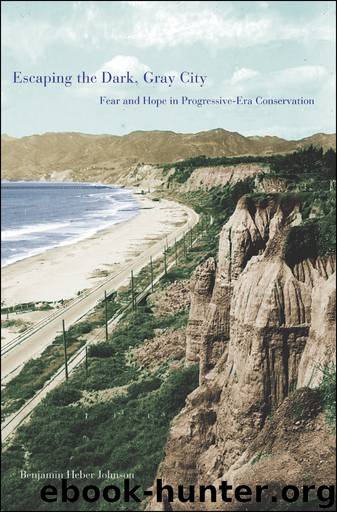Escaping the Dark, Gray City by Benjamin Heber Johnson

Author:Benjamin Heber Johnson
Language: eng
Format: epub
Publisher: Yale University Press
Published: 2017-04-11T04:00:00+00:00
George Washington Carver, 1906. Carver, a Tuskegee Institute agronomist, viewed conservation as one way for African American farmers to secure their economic independence. (Frances Benjamin Johnston, photographer; Booker T. Washington Collection, Prints and Photographs Division, Library of Congress)
Although monopoly was one of the great targets of Progressive ire, there was a way for it to be defended on conservationist grounds. J. B. White of Kansas City struck this note in his address to the Conservation Congress of 1910. The “successful practical application” of conservation, he argued, “often depends very much as to ownership.” Concentrated ownership could easily result in “greater possibilities for conservation.” White contrasted the “country butcher and his fifty percent waste with the million dollar packing house, which has no waste.” He urged delegates to temper their antimonopolistic assumptions, reassuring them that “it is not the fault of conservation that there are extremes in combinations, resulting in trusts or monopolies.” In the end, monopolies “are practicing conservation in the extreme, in saving of raw material by greater utilization, and by the discovery of new uses for by-products, which find a place in therapeutics, in the arts, and in vaseline, paints, dyes and a hundred other valuable chemical products.”50
Some railroad company owners became enthusiastic about particular conservation measures, for similar reasons. They quickly realized that spectacular places such as Yellowstone, Yosemite, and the Grand Canyon would draw more tourists—and thus more passengers and freight for their lines—if they were preserved and managed by the government rather than turned over to private hands. For just such reasons, the Northern Pacific magnate Jay Cooke played a key role in securing Yellowstone’s designation as a national park in 1872. James J. Hill, known as the “Empire Builder” for the power of his Great Northern Railway, was an ardent proponent of national forests and parks. He considered himself a major figure in the development of conservation thought (though he was likely the only person to do so). Hill supported vigorous state preservation of such key resources as soil and timber because he saw their waste as part of a general lack of national efficiency, also manifest in what he thought was the laziness of the workforce and the low working hours of Americans. He deemed the tight money and credit policies so important to the ideology of corporate leaders “the conservation of capital” and urged “friends of conservation” to “take steps everywhere to give to this indispensable possession the same protection from the spoiler that they are trying to give to the soil, the forest, the water power, and deposits of mineral wealth.” In the 1910s, such pronouncements lead the advocates of a national park system—Horace McFarland and his circles chief among them—to solicit railroad companies for financial and political support for their positions. There was an even more compelling economic case for reclamation, since it brought new lands into commercial agricultural production, and thus new customers for railroads.51
Similar motives prompted some conservative elites to back urban conservation in their own cities. Whereas
Download
This site does not store any files on its server. We only index and link to content provided by other sites. Please contact the content providers to delete copyright contents if any and email us, we'll remove relevant links or contents immediately.
Kathy Andrews Collection by Kathy Andrews(11818)
The remains of the day by Kazuo Ishiguro(8983)
Spare by Prince Harry The Duke of Sussex(5185)
Paper Towns by Green John(5184)
The Body: A Guide for Occupants by Bill Bryson(5085)
Industrial Automation from Scratch: A hands-on guide to using sensors, actuators, PLCs, HMIs, and SCADA to automate industrial processes by Olushola Akande(5057)
Machine Learning at Scale with H2O by Gregory Keys | David Whiting(4300)
Be in a Treehouse by Pete Nelson(4043)
Never by Ken Follett(3942)
Harry Potter and the Goblet Of Fire by J.K. Rowling(3850)
Goodbye Paradise(3804)
The Remains of the Day by Kazuo Ishiguro(3401)
Into Thin Air by Jon Krakauer(3389)
Fairy Tale by Stephen King(3378)
The Cellar by Natasha Preston(3337)
The Genius of Japanese Carpentry by Azby Brown(3295)
120 Days of Sodom by Marquis de Sade(3268)
Reminders of Him: A Novel by Colleen Hoover(3100)
Drawing Shortcuts: Developing Quick Drawing Skills Using Today's Technology by Leggitt Jim(3076)
